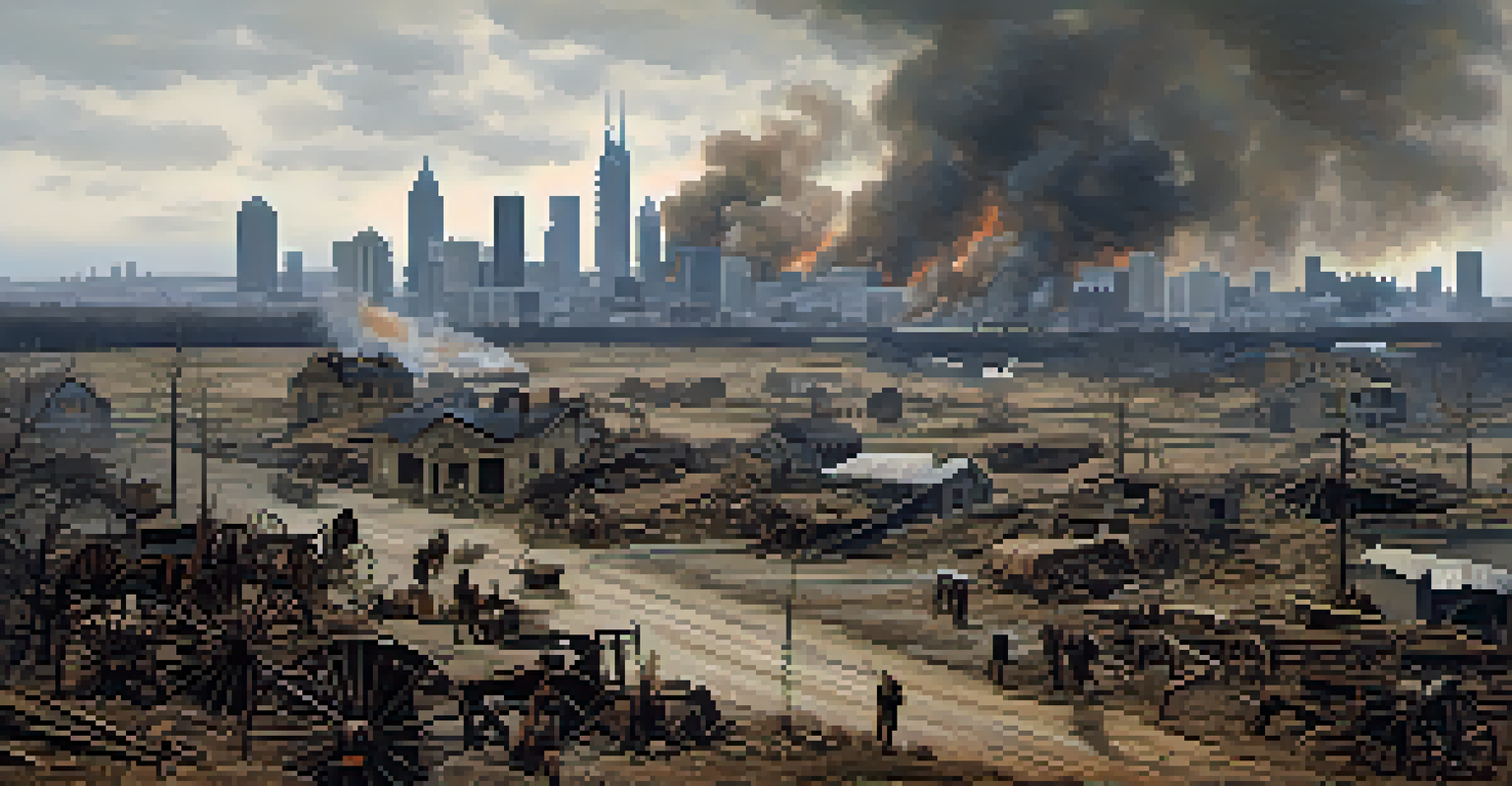Atlanta's Role in the Civil War: A Historical Overview

The Strategic Importance of Atlanta in the Civil War
Atlanta was more than just a city; it was a crucial transportation hub during the Civil War. Located at the crossroads of several major railroads, it allowed the Confederacy to move troops and supplies efficiently. This strategic advantage made it a prime target for Union forces seeking to disrupt Confederate logistics.
Those who cannot remember the past are condemned to repeat it.
The city's railroads connected the South to vital resources, which is why both the Union and Confederate armies viewed it as essential. Control over Atlanta meant controlling the flow of goods and reinforcements. This made the stakes incredibly high for both sides, setting the stage for fierce battles.
As the war intensified, Atlanta's significance only grew. Capturing the city would not only cripple the South's supply chain but also serve as a morale booster for the North. The Union's focus on Atlanta underscored its importance, leading to a series of confrontations that would shape the war's outcome.
The Battle of Atlanta: A Turning Point
The Battle of Atlanta, fought on July 22, 1864, marked a significant turning point in the Civil War. Union General William Tecumseh Sherman faced off against Confederate General John Bell Hood in a battle that would determine the city's fate. This confrontation exemplified the fierce determination of both armies, as they fought for control over Atlanta.

Sherman's forces ultimately emerged victorious, but the battle was not without its costs. The Union side suffered significant casualties, and Hood's army, while defeated, put up a tenacious fight. This battle not only showcased military strategy but also highlighted the human cost of war, with countless lives lost on both sides.
Atlanta's Strategic Role in War
Atlanta served as a crucial transportation hub during the Civil War, making it a key target for Union forces aiming to disrupt Confederate supply lines.
The Union victory in Atlanta had far-reaching consequences. It bolstered Northern morale and contributed to President Abraham Lincoln's re-election in November 1864. The loss of Atlanta was a crushing blow for the Confederacy, symbolizing a shift in momentum that would lead to their eventual defeat.
Sherman's March to the Sea: The Aftermath
After capturing Atlanta, General Sherman initiated his infamous March to the Sea, a campaign aimed at crippling the South's ability to wage war. This march was characterized by a strategy of total war, where not just the enemy's army, but also its economic resources were targeted. Sherman's troops marched from Atlanta to Savannah, leaving destruction in their wake.
Injustice anywhere is a threat to justice everywhere.
The march represented a significant psychological blow to the Confederacy. By destroying infrastructure, crops, and supplies, Sherman aimed to demoralize Southern civilians and soldiers alike. This tactic showcased the brutal realities of war, as communities were left devastated by the Union's advance.
Sherman's campaign was both controversial and effective. While many viewed it as necessary for ending the war, others criticized it for its harshness. Regardless, the march played a crucial role in hastening the end of the conflict, ultimately leading to the Union's victory.
Economic Impacts of the Civil War on Atlanta
The Civil War had profound economic implications for Atlanta, transforming it from a bustling hub into a battlefield. Before the war, the city thrived on trade and transportation, but the conflict disrupted these industries. Railroads were damaged, and businesses were forced to close, leading to widespread economic hardship.
During the war, the destruction wrought by battles and Sherman's march further crippled the local economy. Fields were scorched, and essential resources were depleted, leaving residents struggling to survive. This devastation not only affected the immediate area but also had ripple effects throughout the region.
Impact of Sherman's March
General Sherman's March to the Sea inflicted significant destruction on Southern infrastructure, aiming to demoralize the Confederacy and hasten the war's conclusion.
However, the post-war era did present opportunities for recovery and growth. Reconstruction efforts aimed to rebuild the city, eventually leading to Atlanta's resurgence as a significant economic center. The war, while destructive, set the stage for future development and transformation in the years to come.
Cultural Ramifications of the Civil War in Atlanta
The Civil War left an indelible mark on Atlanta's cultural landscape, shaping its identity for generations. The experiences of both soldiers and civilians during the conflict influenced local traditions, storytelling, and communal memory. As the city rebuilt, it began to reflect on its past, creating a rich tapestry of history and culture.
Memorials and monuments sprang up throughout Atlanta, commemorating those who fought and died during the war. These sites serve as reminders of the sacrifices made and the complex legacies of conflict. They also reflect the city's journey toward healing and reconciliation in the aftermath of war.
Today, Atlanta's cultural fabric is interwoven with its Civil War history. Museums, reenactments, and educational programs keep the memory alive, ensuring that future generations understand the significance of this turbulent time. The cultural impacts of the war continue to resonate, reminding us of the importance of history in shaping our identities.
The Role of Atlanta in Civil Rights Movements
Atlanta's history as a battleground during the Civil War laid the groundwork for its later role in the Civil Rights Movement. The struggles faced during the war echoed in the fight for equality in the 20th century. The city emerged as a key site for organizing and activism, producing influential leaders like Martin Luther King Jr.
The rich history of resistance and resilience in Atlanta provided a powerful backdrop for civil rights activism. Organizations like the Southern Christian Leadership Conference were founded here, mobilizing communities to advocate for social change. The spirit of the Civil War era lived on in these movements, as citizens sought justice and equality.
Cultural Legacy of Civil War
The Civil War deeply influenced Atlanta's cultural identity, shaping its traditions and leading to a lasting commitment to remembering and learning from its history.
Today, Atlanta is celebrated not only for its Civil War history but also for its ongoing commitment to civil rights. Museums and memorials honor the legacy of those who fought for equality, ensuring that the lessons learned from both the war and the civil rights struggles continue to inspire future generations.
Atlanta Today: A City Reflecting on Its Past
In the modern era, Atlanta stands as a vibrant city that reflects on its complex past. The remnants of its Civil War history can be seen in its architecture, public spaces, and cultural institutions. This awareness of history fosters a sense of identity, allowing residents to connect with their heritage.
Atlanta's ongoing dialogue about its history is vital for understanding its current social and political landscape. The city has made significant strides in embracing diversity and promoting inclusivity, learning from the lessons of its past. This evolution is a testament to the resilience and spirit of Atlanta's residents.

As Atlanta continues to grow and change, it remains committed to honoring its history while looking toward the future. The legacy of the Civil War, along with the subsequent civil rights struggles, serves as a guiding force as the city navigates contemporary challenges and opportunities. Atlanta's story is one of transformation, resilience, and hope.